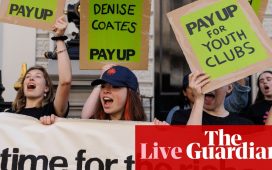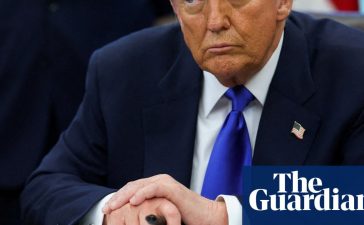Introduction: Global markets anxious about Middle East and inflation
Good morning, and welcome to our rolling coverage of business, the financial markets and the world economy.
The financial markets remain gripped by anxiety over rising tensions in the Middle East, and concerns that the Israel-Hamas war could drive up oil prices, fuelling inflation.
Markets across the Asia-Pacific region are in the red today, with Japan’s Nikkei losing 1.85%, and China’s CSI 300 down 1.9%. That follows a sell-off yesterday in Europe, and then losses on Wall Street.
Gold hit its highest level since 1 August yesterday, touching $1,962 per ounce, as investors favoured traditional safe-haven assets.
Oil jumped too, with Brent crude hitting $93 per barrel on Wednesday, before slipping back to $91 this morning.
Investors have also been driving down the price of government bonds.
This pushed the yield, or interest rate, on 10-year US government bonds to their highest since 2007, early in the financial crisis.
Meanwhile, the US treasury yields continue to move up. The 10-year yield is at a 16-year high of 4.91% while the 30-year yield crossed 5% for the first time since 2006👀 pic.twitter.com/jqQ20C4nH2
— Diversitas (@Diversitas_LTD) October 19, 2023
Global investors are focused on the Middle East, where US president Joe Biden yesterday met with Israeli PM Benjamin Netanyahu – who has pledged to allow aid into Gaza via Egypt.
But Biden’s meetings with leaders from the Arab world were cancelled, following the explosion at Gaza’s al-Ahli Arab hospital
Risky assets face the double risks of higher real yields and increasing geopolitical tensions, says Mohit Kumar, chief economist for Europe at investment bank Jefferies.
He told clients:
Geopolitical risks moved up a notch [yesterday] as Biden’s peace visit was snubbed by a number of Arab countries. Peace efforts are ongoing with the UK’s PM expected to make a visit to the region.
Rating agency Standard & Poor’s fears that the crisis could create a new inflationary shock, and hurt global growth, if it escalates.
In a new report they warned:
“Even in the absence of a material energy supply shock, the evident sensitivity in energy prices to recent events indicates that some inflationary pressures could persist through the northern hemisphere winter.”
The agenda
-
8.30am BST: Bank of Indonesia sets interest rates
-
1.30pm BST: US weekly jobless claims
-
5pm BST: Federal Reserve chair Jerome Powell speaks at the Economic Club of New York
Key events
Oil drops as US eases Venezuela sanctions
There’s drama in the oil markets again today, where prices are down almost 2%.
Brent crude has dropped back below $90 per barrel, away from yesterday’s two-week high of $93.
The tumble comes after the US government announced last night it is easing sanctions on Venezuela’s oil sector.
The U.S. Treasury Department has issued a new licence authorizing Venezuela – a member of Opec – to produce and export oil to its chosen markets for the next six months without limitation.
The prospect of more crude hitting the markets has pushed down the oil price, explains Joshua Mahony of Scope Markets.
For energy markets, the prospect of conflict in the Middle East has been overshadowed by the confirmation that sanctions on Venezuelan energy exports have been lifted, with Biden hoping to negate the inflationary efforts of OPEC+ by flooding the world in cheap oil.
However, while Venezuela holds the largest proven oil reserves of any country, years of underinvestment means that the upside may be limited to roughly 200,000 barrels per day for the time being.
The deal between the Washington and Caracas should also allow banned opponents of President Nicolás Maduro to compete in next year’s election.
UK consumers cut back on spending last week, according to the latest real-time economic indicators.
UK spending on debit and credit cards decreasing in all categories last week, the Office for National Statistics reports.
Total debit card expenditure through Revolut fell by 6% in the week to 8 October 2023, the ONS says.
And “aggregate” spending on credit and debit cards (measured by the Bank of England) decreased by 8%, including a 10% drop in staple goods and a 7% drop in spending on social activities.
Overall footfall at UK retailers dropped by 1%, to 99% of the level in the previous week, as fewer people visited the high street.
New economic activity and social change data shows in the latest week, there were decreases in:
💳 debit and credit card purchases
🛍️ UK retail footfallIn contrast, the demand for fuel per transaction increased when compared to the previous week ⛽
➡️ https://t.co/U2VZ7RmW2M pic.twitter.com/buzrRQUvsi
— Office for National Statistics (ONS) (@ONS) October 19, 2023
Unexpected interest rate hike in Indonesia
Over in Jakarta, the central bank of Indonesia has unexpectedly raised interest rates, to support its currency in the face of rising geopolitical risks.
Bank Indonesia increased its seven-day reverse repurchase rate by 25 basis points to a fresh four-year high of 6%, surprising economists who had expected no change today.
The move follows rising pressure on the rupiah, which had fallen to its lowest in over three years as nervous investors sought out safe-haven assets.
BI governor Perry Warjiyo said.
“This increase is to strengthen stabilisation measures for the rupiah against the impact of increasing global uncertainty, and as a pre-emptive and forward-looking step to mitigate its impact on inflation through imported goods.”
Warjiyo described the global market condition as “fast changing and very unpredictable”.
ING analyst Nicholas Mapa says Bank Indonesia was forced to raise interest rate by the “intense pressure” on the rupiah.
Mapa explains:
The central bank believes that the global economy is set to face increasing headwinds with uncertainty on the uptick, and indicated that a “stronger policy response” was needed given the heightened uncertainty in the financial markets. It now predicts that global growth should settle around 2.9% year-on-year in 2023 and 2.8% next year with the US Federal Reserve now set to keep rates higher for longer. Given the backdrop, BI sees capital outflow persisting for the rest of the year.
With the Rupiah down 1.77% for the month, BI had little choice but to whip out additional policy support for the currency.
A wary mood is spreading in the markets today, as the Middle East crisis looks increasingly intractable, while a high-interest rate environment looks set to stay for longer.
That’s the view of Susannah Streeter, head of money and markets at Hargreaves Lansdown, who explains:
President Biden has left Israel, having extracted a promise of aid for Gaza, but there are little signs of an easing in high tensions.
Other diplomatic efforts will be closely watched, with the UK’s Prime Minister visiting Israel, and the foreign secretary meeting leaders in neighbouring countries, but a resolution still looks very difficult to achieve and concerns remain about the conflict potentially widening.
Oil prices have dipped back after shooting higher yesterday but Brent is still trading above $90 dollars a barrel as supply concerns continue to swirl amid the Middle East turmoil.
Consumer goods maker Nestlé has reported a drop in sales volumes, after hiking prices.
Nestlé says its real internal growth (RIG) – a measure of sales volumes – fell 0.6% in the first nine months of this year.
Prices have risen by 8.4% this year, leading to organic growth of 7.8%.
Prices for Nestlé’s Water and Petcare producs are both up 10.4% this year.
Nestlé has also said it has “temporarily shut down” of one of its production plants in Israel as a “precaution”.
Nestlé chief executive Mark Schneider said on an earnings call with journalists:
“Our focus is on keeping our colleagues and employees safe. I have no comment on the development of the business,”
“We’ve taken necessary precautions.”
Shares in Nokia have dropped by 1.4% in early trading, after it announced a drop in sales in the last quarter and a cost-cutting plan.
This has helped to drag the Finland’s benchmark share index, the OMX Helsinki 25, down by 0.9% to a three-year low this morning.
France’s CAC 40 share index has hit a seven-month low in early trading, down 0.9%, Reuters reports, as a risk-off mood sweeps European markets.
FTSE 100 drops, dragged down by Rentokil and Rightmove
Britain’s stock market is open…. and shares are falling.
The FTSE 100 index of blue-chip shares has shed 77 points, or 1%, to hit 7512 points – the lowest in over a week.
Every sector is in the red, led by Industrial stocks, Technology and Financials.
Pest control firm Rentokil are down 13%, after warning of softer demand from consumers in North America.
Rentokil says revenues at its US products wholesale distribution business fell by 2.5% in the quarter, reflecting “lower demand for chemical products for use in pest control and in turf and ornamental end markets”.
Online property portal Rightmove have also fallen by 13%, after its smaller rival OnTheMarket agreed to be bought by CoStar Group, a $33bn New York-listed property giant (announcement here).
Exclusive: OnTheMarket, the London-listed agent-backed property portal, has agreed to be bought by CoStar, the giant American real estate group, for about £100m in a deal that will give it the firepower to take on bigger rivals Rightmove and Zoopla. https://t.co/Yux8T4jaBC
— Mark Kleinman (@MarkKleinmanSky) October 18, 2023
US 10-year Treasury yields nearing 5%
The rise in US government bond yields is causing anxiety in the markets, reports Kyle Rodda of Capital.com.
The yield (or interest rate) on 10-year Treasuries is nearing 5%, for the first time in 16 years. This indicates investors are concerned that inflation will remain higher for longer than hoped, prompting central banks to keep monetary policy tight.
Rodda says this increase (to 4.96% right now) is weighing on share prices, and financial conditions.
While the crisis in the Middle East is a source of significant uncertainty, a problem running at the markets like a freight train is the continued upward pressure on bond yields.
The causes of the move remain multi-faceted: resilient US growth, profound US deficits and subsequently onerous Treasury issuance, supply shocks stemming from the energy markets, and the Fed’s quantitative tightening. There’s debate about which factor reigns supreme as the primary driver of bond market dynamics.
Nevertheless, the inescapable reality US Treasuries are climbing towards 5% right across the curve, which is weighing heavily on equity market valuations and future global financial conditions.
Nokia to cut up to 14,000 jobs as sales fall

There’s bad news from the telecoms sector this morning – Nokia is planning to cut up to 14,000 jobs
The Finnish telecoms equipment maker is cutting its workforce in a new cost-cutting drive, following a drop in sales.
The drive will cut its workforce from 86,000 today, to between 72,000 and 77,000, as Nokia aims to cut its costs by up to €1.2bn over three years.
The news comes as Nokia also announced that sales fell by 20% in the last quarter, which it blames on “macroeconomic uncertainty and higher interest rates” which are hitting spending by mobile operators.
Nokia’s President and CEO Pekka Lundmark said:
“We continue to believe in the mid to long term attractiveness of our markets. Cloud Computing and AI revolutions will not materialize without significant investments in networks that have vastly improved capabilities.
However, while the timing of the market recovery is uncertain, we are not standing still but taking decisive action on three levels: strategic, operational and cost.
First, we are accelerating our strategy execution by giving business groups more operational autonomy. Second, we are streamlining our operating model by embedding sales teams into the business groups and third, we are resetting our cost-base to protect profitability. I believe these actions will make us stronger and deliver significant value for our shareholders.”
European stock markets are set for further losses today.
The futures market shows the UK’s FTSE 100 on track to fall 0.35% when trading begins at 8am.
Germany’s DAX futures are down almost 0.6%, as is the pan-European Eurostoxx 50.
Jim Reid, strategist at Deutsche Bank, says:
The market selloff gathered pace over the last 24 hours, as rising geopolitical risks and a fresh surge in long-term borrowing costs added to the downbeat mood.
The main drivers were investor fears about an escalation in the Middle East, which drove gold prices (+1.34%) to their highest since the end of July and meant the rebound in oil prices continued, with Brent Crude up a further +1.78% to $91.50/bbl.
But the negative sentiment was clear throughout global markets, and the 10yr Treasury yield (+8.1bps) closed at a new post-GFC [Global Financial crisis] high of 4.91%, and this morning is up a further +4.7bps to 4.96%, which leaves it within touching distance of 5% for the first time since July 2007
Introduction: Global markets anxious about Middle East and inflation
Good morning, and welcome to our rolling coverage of business, the financial markets and the world economy.
The financial markets remain gripped by anxiety over rising tensions in the Middle East, and concerns that the Israel-Hamas war could drive up oil prices, fuelling inflation.
Markets across the Asia-Pacific region are in the red today, with Japan’s Nikkei losing 1.85%, and China’s CSI 300 down 1.9%. That follows a sell-off yesterday in Europe, and then losses on Wall Street.
Gold hit its highest level since 1 August yesterday, touching $1,962 per ounce, as investors favoured traditional safe-haven assets.
Oil jumped too, with Brent crude hitting $93 per barrel on Wednesday, before slipping back to $91 this morning.
Investors have also been driving down the price of government bonds.
This pushed the yield, or interest rate, on 10-year US government bonds to their highest since 2007, early in the financial crisis.
Meanwhile, the US treasury yields continue to move up. The 10-year yield is at a 16-year high of 4.91% while the 30-year yield crossed 5% for the first time since 2006👀 pic.twitter.com/jqQ20C4nH2
— Diversitas (@Diversitas_LTD) October 19, 2023
Global investors are focused on the Middle East, where US president Joe Biden yesterday met with Israeli PM Benjamin Netanyahu – who has pledged to allow aid into Gaza via Egypt.
But Biden’s meetings with leaders from the Arab world were cancelled, following the explosion at Gaza’s al-Ahli Arab hospital
Risky assets face the double risks of higher real yields and increasing geopolitical tensions, says Mohit Kumar, chief economist for Europe at investment bank Jefferies.
He told clients:
Geopolitical risks moved up a notch [yesterday] as Biden’s peace visit was snubbed by a number of Arab countries. Peace efforts are ongoing with the UK’s PM expected to make a visit to the region.
Rating agency Standard & Poor’s fears that the crisis could create a new inflationary shock, and hurt global growth, if it escalates.
In a new report they warned:
“Even in the absence of a material energy supply shock, the evident sensitivity in energy prices to recent events indicates that some inflationary pressures could persist through the northern hemisphere winter.”
The agenda
-
8.30am BST: Bank of Indonesia sets interest rates
-
1.30pm BST: US weekly jobless claims
-
5pm BST: Federal Reserve chair Jerome Powell speaks at the Economic Club of New York








